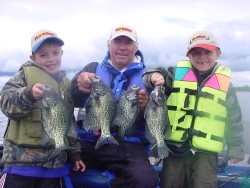 The sport of recreational angling has changed drastically over the years. The advancement of equipment, from global positioning systems to holographic lures, has been a visible evolution. The transfer of fish-catching information, such as techniques and location, has exploded through print, television, the Internet, and word of mouth. Anglers are more vocal about resource issues. Natural resource officials have increased their communication with angling enthusiasts. They’ve played a larger management role in terms of fish populations, imposing special regulations.
The sport of recreational angling has changed drastically over the years. The advancement of equipment, from global positioning systems to holographic lures, has been a visible evolution. The transfer of fish-catching information, such as techniques and location, has exploded through print, television, the Internet, and word of mouth. Anglers are more vocal about resource issues. Natural resource officials have increased their communication with angling enthusiasts. They’ve played a larger management role in terms of fish populations, imposing special regulations.
What does the future hold for fishing? How big will boats and motors get? Where else will electronics take us? What will lures look like in fifty years? What special regulations will be in place? What will the quality or our lakes and rivers be?
I sure hope I’m around to find out! It’s more likely that my kids will be though. My six and five-year-old sons enjoy fishing already. My one year-old daughter had her first boat ride last summer. Hopefully, fifty years from now they’ll be the future of fishing and enjoy it as much as I do now.
Kids have many activities competing for their attention these days. Video games are pretty attractive to the young mind. Television offers just a little more variety than it did when was kid! Internet chat lines sound popular too. Hmm . . . none of the above requires much physical effort. In fact, one doesn’t need to leave the comforts of the house to enjoy these activities. The bottom line is that fewer kids are getting outdoors. The average age of anglers and hunters is increasing.
So . . . who will communicate sportfishing concerns to resource officials in the future? More importantly, who will support our basic rights to fish, if and when such an issue would come to a vote? The individual exposed to fishing at some point in his or her life, regardless of whether it becomes a personal lifetime activity, is more likely to vote for anglers’ rights than the person who never wet a line. The same is true for hunting. That guy whose neighbor took him fishing a few times as a kid may not become an avid fisherman. But, he may see the value in the sport, the conservation involved, and the enjoyment it brings to many. He may recall those trips and vote “our way”.
Winter is a great time to get young people excited about fishing. Keep it fun. Remember, we are competing against Play Stations, MTV, and the Internet. My kids like to have a big lunch along. Who doesn’t? They enjoy playing with the minnows, sorting through the tackle box, and running around in the snow. We talk about safety issues, conservation, biology, the weather, and everything under the sun.
Fishing is an avenue that brings families or adults and kids together. The way I look at it, if I can get my kids in the boat or in the fish house with me, they have to communicate with me! They can’t disappear into the other room. I see anglers of all ages who go fishing together work as a team too, more so than they might in other settings. I try to assign my kids jobs in the boat or fish house. One might be the “fish counter” while the other rations out the snacks. As far as fishing, we go for action. It’s hard to beat bobber fishing for panfish. On ice, perch are the way to go.
If you’ve read this article, you must enjoy fishing. Pass it on to the next generation. They are the future of fishing!

